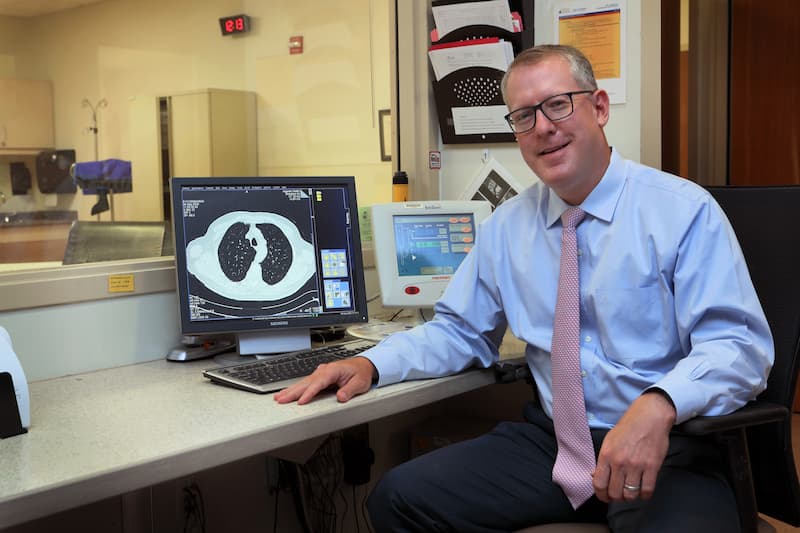A Conversation with Kevin Lawrence, MD

Date: November 4, 2021
Categories: Press Release
A CONVERSATION WITH…
KEVIN LAWRENCE, MD
Augusta Health Pulmonology
Kevin Lawrence, MD, is a critical care specialist and pulmonologist at Augusta Health. While practicing pulmonology and critical care medicine provides him an excellent opportunity to diagnose and treat a wide range of diseases, his training in advanced bronchoscopy gives him an expertise in the diagnosing and treating of lung cancer. Dr. Lawrence completed medical school at the University of Arkansas for Medical Sciences, followed by residency and fellowship at Barnes-Jewish Hospital/Washington School of Medicine. He is Board Certified in three specialties: Internal Medicine, Pulmonary Medicine and Critical Care Medicine.
“Lung cancer is the deadliest form of cancer. More people die from lung cancer than the next top three cancers combined,” says Dr. Lawrence. “One of the reasons it is so deadly is that, until recently, we haven’t really had an effective way to screen for lung cancer before people had symptoms. Like other cancers, though, if lung cancer is diagnosed at an early stage, there are more treatment options available and the survival rate increases.”
“In the last decade or so, low-dose CT, or LDCT, has become a way to screen for lung cancer in a specific group of people—those at high risk for lung cancer,” adds Dr. Lawrence. “We can provide this population with an LDCT, which is a screening exam. So having an LDCT doesn’t mean we expect you have lung cancer, it means we believe you are at a high risk to develop it. We want to screen you annually so if you do develop lung cancer, we can diagnose it early. It’s very similar to having an annual mammogram to screen for breast cancer.”
Because cigarette smoking is linked to about 90% of lung cancers, the current criteria for LDCT focuses on current and former heavy smokers. “We are working to expand the current criteria, though, and hope that expansion will come soon,” says Dr. Lawrence.
An LDCT screening is quick and painless. There is no preparation, no fasting, no needles and nothing to drink. Patients lie on their backs with arms overhead, and the most strenuous request is to hold their breath for 10 seconds.
LDCT screening helps improve the chance for survival. Studies have shown a 14-20% decrease in lung cancer mortality in high-risk patients who have a yearly LDCT screening (American Lung Association (http://www.lung.org/lung-health-and-diseases/lung-disease-lookup/lung-cancer/resource-library/lung-cancer-fact-sheet.html). The 5-year survival rate for lung cancer is less than 20%. But when detected early and the disease is limited to the lungs, that survival rate jumps to higher than 55%.
“Although the LDCT is an important tool, at Augusta Health, we provide a robust lung cancer screening program, not just a test,” Dr. Lawrence explains. “So here, it’s not just the LDCT. There are follow-up discussions to review what we’ve found, to recommend programs for better lung health, to provide treatment if necessary, and also to decide what ‘next steps’ are best. For most, it’s advice to repeat the LDCT in a year. Others might be advised to repeat the LDCT in three to six months, and others might be referred for diagnosis and treatment.”
Augusta Health’s LDCT program began in April, 2014, and has grown steadily each year. In 2014, an average of four LDCTs were completed each month. Last year, the monthly average was 120.25 LDCTs each month, and in 2021, through August, the monthly average has been 137.25 LDCTs per month. Through September of 2021, 99 lung cancers have been diagnosed through the LDCT program, many in an early stage.
“Our Lung Cancer screening program has been a real success story,” adds Dr. Lawrence. “We are finding cancers before people are symptomatic, and so we are improving their chances for survival.”
Current Criteria for Lung Cancer Screening through LDCT
Currently, LDCT Screening is approved by insurance companies for these people considered at high risk for lung cancer:
- No visible symptoms of lung cancer
- Age 55-80 years old
- A history of smoking at least 30 pack-years
- To determine pack years, the formula is number of packs of cigarettes smoked per day X the number of years of smoking. For example, 2 packs per day for 15 years is 2 X 15, or 30 pack years.
- Current smoker, or quit within the past 15 years.
- No conditions that would prevent effective treatment of lung cancer
For more information about LDCT screening, lung cancer or to make an appointment with Dr. Lawrence, please contact:
AUGUSTA HEALTH PULMONOLOGY
70 Medical Center Circle
Suite 308
Fishersville, VA 22939
540-245-7190
Monday through Friday
8:00 am – 4:30 pm
